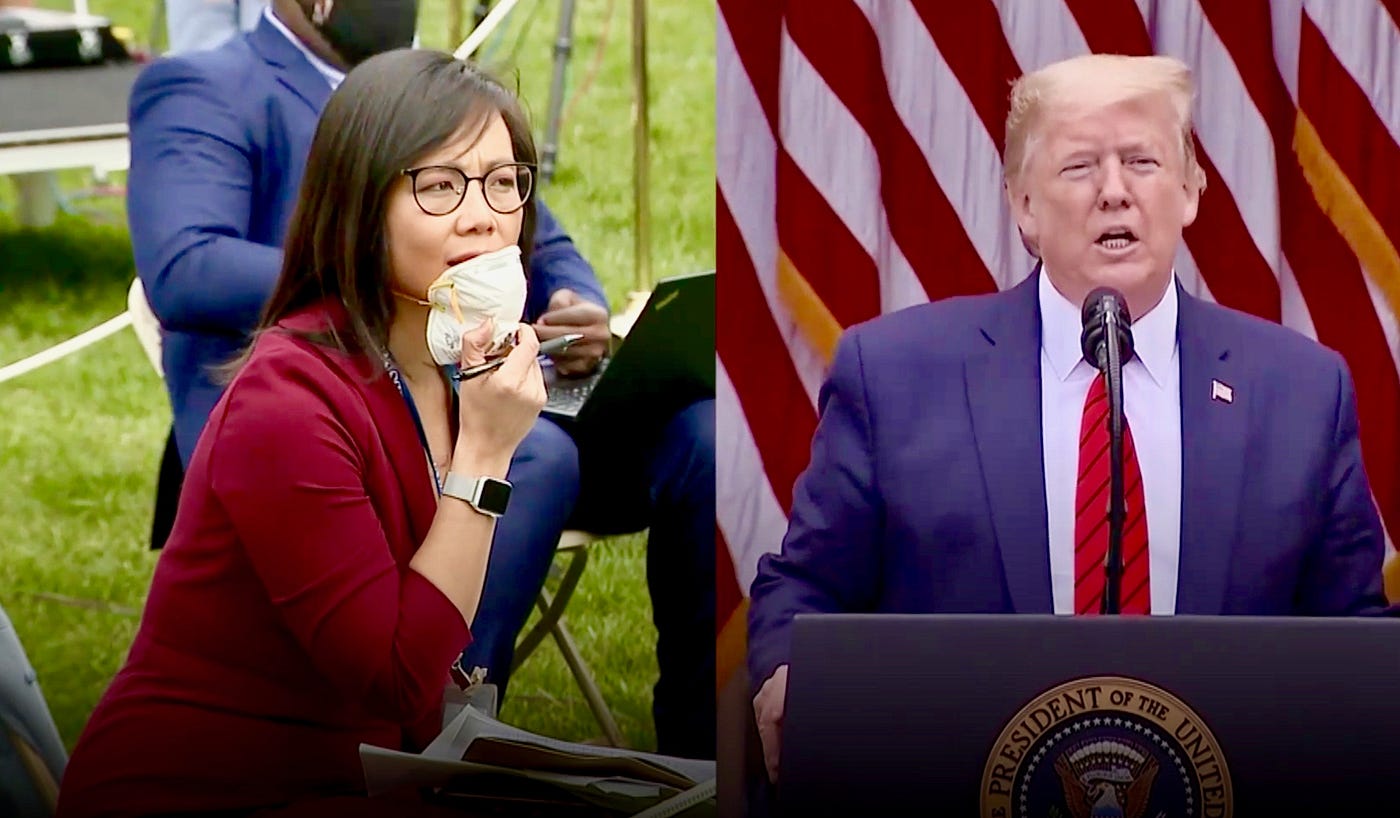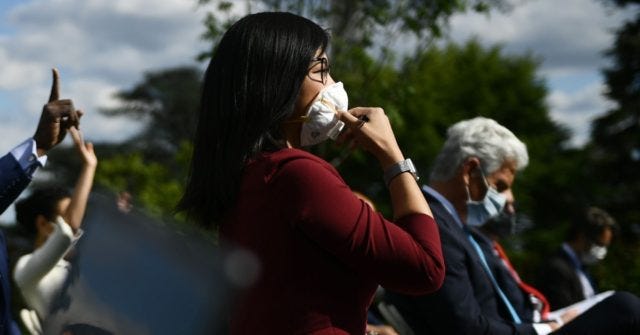Why are you saying that
Why are you saying that
“Why are You Saying That to Me, Specifically?”
Weijia Jiang challenges President Trump’s racial rhetoric at the White House Press Conference, prompting his meltdown and exit
5/12/20 Washington, D.C. — At Monday’s White House Press Conference, CBS reporter Weijia Jiang’s question to the president regarding coronavirus testing rates led to a tense exchange that resulted in his immediate departure from the briefing.
Jiang: You’ve said many times that the U.S. is doing far better than any other country when it comes to testing. Why is this a global competition to you if everyday Americans are still losing their lives and we’re still seeing more cases?
Trump: Well, they’re losing their lives everywhere else in the world. And maybe that’s a question you should ask China. Don’t ask me, ask China that question. Okay? When you ask them that question, you may get a very unusual answer. Next question!
Jiang takes off her face mask and stands up.
Jiang: Why are you saying that to me, specifically? To ask China?
Trump: I’m not saying that specifically to you. I’m saying that to anybody who would ask such a nasty question like that. Okay? Next question!
Jiang: Why does it matter?
Trump ignores Jiang. CNN reporter Caitlan Collins of CNN is about to ask her question when the president retracts and calls on another reporter. Collins asserts herself, stating that she was called on by the president and was going ask him her questions. Trump angrily thanks the crowd and walks away from the podium, stunning the reporters silent.
The Significance of Jiang’s Clapback
During their exchange, Trump alluded to Jiang that she — a Chinese American reporter — should direct her question to China. First, that doesn’t make any sense, since her question is about coronavirus testing rates in the U.S.. Second, explicitly telling one of the only Asian reporters to direct her question to the country of her national origin rather than the one she serves in is inexcusably racist and further memorializes the perpetual foreigner stereotype.
This is not the first time President Trump has directed racially incendiary language at a female, non-white journalist. However, Weijia Jiang’s response to the president is pivotal for Asian Americans during the pandemic. Since the coronavirus outbreak first erupted in the U.S., discrimination and hate crimes against Asian Americans have spiked. These include not only physical acts of violence, but also racially charged rhetoric that are only exacerbated by the vehement language the president and his administration use when discussing how “China is going to pay” for the coronavirus.
When the sanctity of Asian American identity is (as usual) under attack, the message that the President sends to an Asian American reporter is a proxy for how the American psyche will regard Asian Americans.
If Jiang silently accepted Trump’s racially charged dodging of the question, then this act would have helped solidify the further marginalization of Asians in an incredibly polarized America.
Instead, Jiang uses her voice to stand up for not only herself, but for the Asian American community. She calls Trump out on his racist rhetoric, and he doesn’t take it well.
His defense is that he would have given that response to any reporter. Really?Considering he has never told a reporter to “ask your question to China,” and he probably never will to a non-Asian reporter, I wouldn’t take his word for it.
After his response, Jiang still isn’t done with him.
She fires another question at him, but it is clear at that point, he is backing out and trying to change the topic by answering a different question. But the damage has been done, and perhaps he is also aware of this. Soon after, Trump turns his back to the reporters and walks off the stage.
Jiang’s clapback signifies the unwillingness to accept the treatment Asian Americans are receiving as a response to COVID-19, and the refusal to remain silent in the face of injustice and fear. She demonstrates how a single person can shake establishments and shape the collective imagination.
Jiang personifies the power of raising your voice and being heard.
We commend Ms. Jiang for her courage, eloquence, and tenacity. We also commend Ms. Collins for 1) giving Ms. Jiang the time to respond and 2) articulating her sense of self worth to the President of the United States.
buttle
Senior Member
Is there any difference between :
About the context, it could be something like: somebody insulted someone else and unfortunately their mum was listening and asked her child : «. «
bibliolept
Senior Member
xiaoJ
Senior Member
Agree with bibliolept. A few other contexts for clarity:
A: Paris is the greatest city in the world!
B: Why would you say that? (=neutral question, equivalent to «Why do you say that?»)
buttle
Senior Member
se16teddy
Senior Member
— Mrs X, your little Johnny told my little girl to f off!
— Johnny, why did / would you say that?
I would say that did here implies that Little Johnny did say it.
As ever, there are a number of possible interpretations of would.
— Would might be conditional (though I am not clear what the implied condition is). If so, it does not necessarily imply that Johnny said it; in fact the use of the conditional seems to hint that Mrs X doubts whether Johnny said it.
— Alternatively, would could be used as a past tense, in one of its senses relating to the will. It might mean something like why did you insist on saying that?, or why did you take it into your head to say that?

